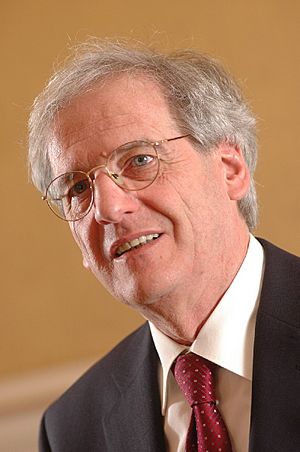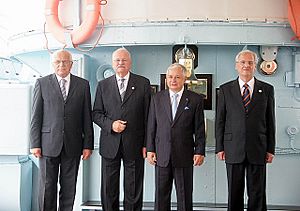László Sólyom facts for kids
Quick facts for kids
László Sólyom
|
|
|---|---|

Sólyom in 2009
|
|
| President of Hungary | |
| In office 5 August 2005 – 5 August 2010 |
|
| Prime Minister | Ferenc Gyurcsány Gordon Bajnai Viktor Orbán |
| Preceded by | Ferenc Mádl |
| Succeeded by | Pál Schmitt |
| President of the Constitutional Court | |
| In office 1 August 1990 – 24 November 1998 |
|
| Preceded by | Position established |
| Succeeded by | János Németh |
| Personal details | |
| Born | 3 January 1942 Pécs Kingdom of Hungary |
| Died | 8 October 2023 (aged 81) |
| Political party | Independent (1989–2023) |
| Other political affiliations |
Hungarian Democratic Forum (1987–1989) |
| Spouses |
Erzsébet Sólyom
(m. 1966; died 2015) |
| Children | Benedek Beáta |
| Alma mater | University of Pécs |
László Sólyom (born January 3, 1942 – died October 8, 2023) was an important Hungarian leader. He was a lawyer and a librarian. From 2005 to 2010, he served as the President of Hungary. Before that, he was the main judge of the Constitutional Court of Hungary from 1990 to 1998.
Contents
Early Life and Education
László Sólyom was born in a city called Pécs in southern Hungary. He studied law at the University of Pécs and finished his degree in 1965.
After university, he became a professor (teacher) at different law schools in Budapest. He also spent three years teaching in Germany, where he earned another law degree.
Start of His Political Career
Sólyom's political journey began in the late 1980s. He worked as a legal advisor for groups that cared about people's rights and the environment.
He helped start a group called Danube Circle. This group worked to protect the environment. They were especially against building a large dam system called the Gabčíkovo - Nagymaros Dams. They believed the dams would harm the natural home of animals and plants along the Danube River.
Sólyom was also one of the people who founded the Hungarian Democratic Forum (MDF) in 1987. This party played a big role in Hungary's change to a parliamentary democracy. This is a system where people elect representatives to make laws.
Role in the Constitutional Court
In 1989, László Sólyom left party politics. He was chosen to join the new Constitutional Court of Hungary. This court makes sure that laws follow the country's main rules, called the Constitution.
Half a year later, his fellow judges elected him as the court's president. He held this important job until 1998. During his time, the Constitutional Court helped build and strengthen democracy in Hungary.
He helped make big changes, like ending the capital punishment (death penalty). He also worked to protect people's rights to information, a healthy environment, and freedom of opinion. The court's decisions under his leadership were praised around the world.
After the Court
After his nine years at the Constitutional Court, Sólyom went back to teaching at universities. In 2000, he helped create Védegylet, which is an environmental and civil rights group.
He also became a member of the Hungarian Academy of Sciences. This is a very respected group of scientists and scholars in Hungary.
Becoming President of Hungary
László Sólyom was suggested as a candidate for President by Védegylet, the environmental group he helped found. Many important people from different political sides supported him.
In Hungary, the president is chosen by the Parliament. Sólyom needed the support of political parties in Parliament. The opposition parties, Fidesz and Hungarian Democratic Forum, agreed to support him.
The ruling parties had their own candidate. However, one of the smaller parties in the government did not support her. Because of this, they did not vote, which helped Sólyom get enough votes to become President. He took office on August 5, 2005.
Main Goals as President
As President, László Sólyom focused on three main areas:
- Upholding the Rule of Law: He wanted to make sure that Hungary always followed its laws and the Constitution.
- Supporting Hungarians Abroad: He felt a special duty to help ethnic Hungarian groups living in neighboring countries.
- Protecting the Environment: He often spoke about the importance of protecting nature, including biodiversity (the variety of life on Earth) and the dangers of climate change.
Honours and Awards
László Sólyom received many awards from Hungary and other countries for his work. These awards recognized his contributions to law, democracy, and environmental protection.

See also
 In Spanish: László Sólyom para niños
In Spanish: László Sólyom para niños
 | Aaron Henry |
 | T. R. M. Howard |
 | Jesse Jackson |

